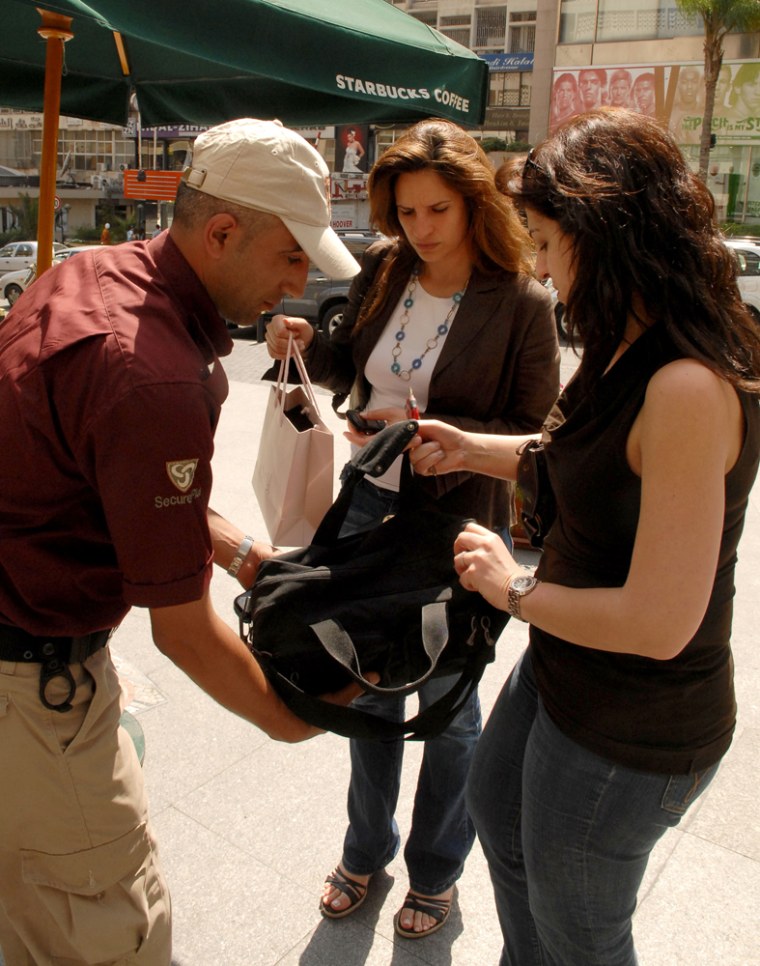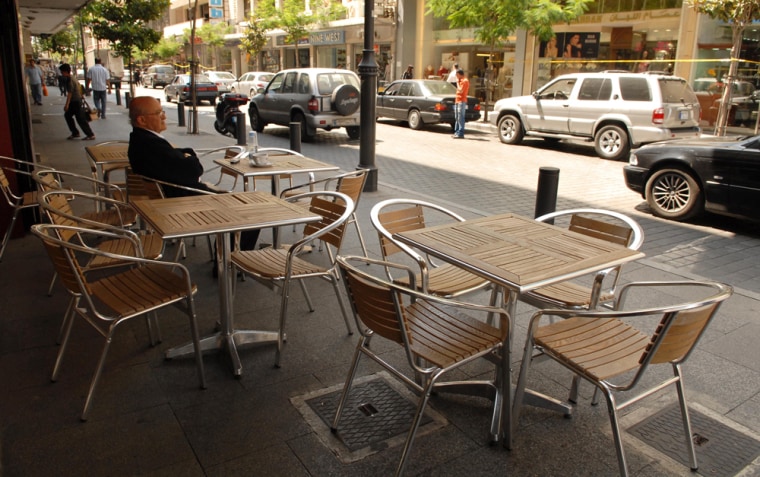Last summer it was Israeli airstrikes and Hezbollah rockets. This year, it’s al-Qaida-inspired militants and explosions keeping tourists away. This small, trouble-plagued country is once again set to lose millions of much-needed tourism dollars because of unrest.
“Thank God, each summer we have something different so that we don’t get bored,” said a sarcastic Rola Bejjani, a vendor in an empty shoe store at a deserted Beirut shopping center. “I haven’t made a single sale in four days.”
Summer is traditionally the high tourist season for Lebanon, when hundreds of thousands of visitors — particularly Arabs from the oil-rich Gulf, and many Lebanese living abroad — usually flood into the country to enjoy its nightlife, beaches and mountain resorts.
Lebanon was expecting more than 1.6 million tourists in the summer of 2006. But then the war between Israel and Hezbollah erupted on July 12. Tens of thousands of tourists and Lebanese streamed out — many evacuated on military and commercial ships — as Israeli airstrikes pounded the country.
The monthlong war left more than 1,000 people dead in Lebanon and about 150 in Israel and destroyed Lebanese bridges, roads and other infrastructure.
The Tourism Ministry and tour operators had been preparing to promote new programs to lure back tourists this summer.
But now this year’s season is threatened by fighting between Lebanese troops and Fatah Islam militants in the Nahr el-Bared Palestinian refugee camp in northern Lebanon.
Even before the battle erupted May 20, businessmen and tourism officials were worried over the fallout from the political power struggle that has turned violent several times this year.
Supporters of the Hezbollah-led opposition have been camping out in Beirut since Dec. 1, paralyzing the city’s commercial heart as part of its campaign to topple Prime Minister Fuad Saniora’s government.

The tensions had gotten so high that business leaders and trade unionists pleaded with rival camps to call a break from the mud-slinging campaigns in the media from June 1 to Sept. 10 for the sake of the tourist season and the economy.
“Together, for the 100-day truce,” read blue, white and yellow billboards put up around the city.
To many, they now seem sadly outdated — from a time when the political differences were the only worry. “We have Fatah Islam to deal with now,” said Bejjani.
The Nahr el-Bared fighting has dragged on, with the army besieging the camp, trying to uproot the militants inside.
Moreover, a series of nighttime explosions — five until Monday — has rocked Beirut and its suburbs since May 20, killing at least two people and wounding scores.
It’s not clear whether the explosions are linked to the fighting at the camp. But they have spread fear among the Lebanese, and thousands of expatriates and Arab visitors have canceled planned trips to Lebanon this summer, according to tour operators. In malls, shops and some office buildings, vehicles and bags are meticulously searched.
Newspapers regularly carry notices of cancellations or postponements of wedding receptions, concerts and conferences.
After dark, Beirut’s streets are largely deserted, the only traffic being at military checkpoints. Some bars and restaurants — even on Gemayzeh Street, where business went on as usual during the Israel-Hezbollah war — now close early for lack of customers.
A few adamant revelers say half-jokingly they wait until 11 p.m. to go out to let any bombs that are planned explode first — most of the attacks have taken place between 8 and 11 p.m.
“It is a real catastrophe ... So many institutions are just barely surviving,” said Paul Ariss, president of the syndicate of restaurant owners.
“The only traffic at Beirut airport this year is outgoing. It’s either Lebanese vacationing outside to escape the violence or young Lebanese going to work abroad,” he said.
Airport statistics show a 7 percent drop in arrivals during the first five months of 2007 compared to the same period last year. Airlines have reduced their flights to Beirut. A prominent hotel reported a drop in bookings.
But Adnan Kassar, the head of the Business Association, said it was too early to say the Nahr el-Bared fighting has killed the summer.
“All is not lost yet,” he said. “If the army is able to end the standoff in its favor soon, then it is more than possible to salvage part of the summer season.”
